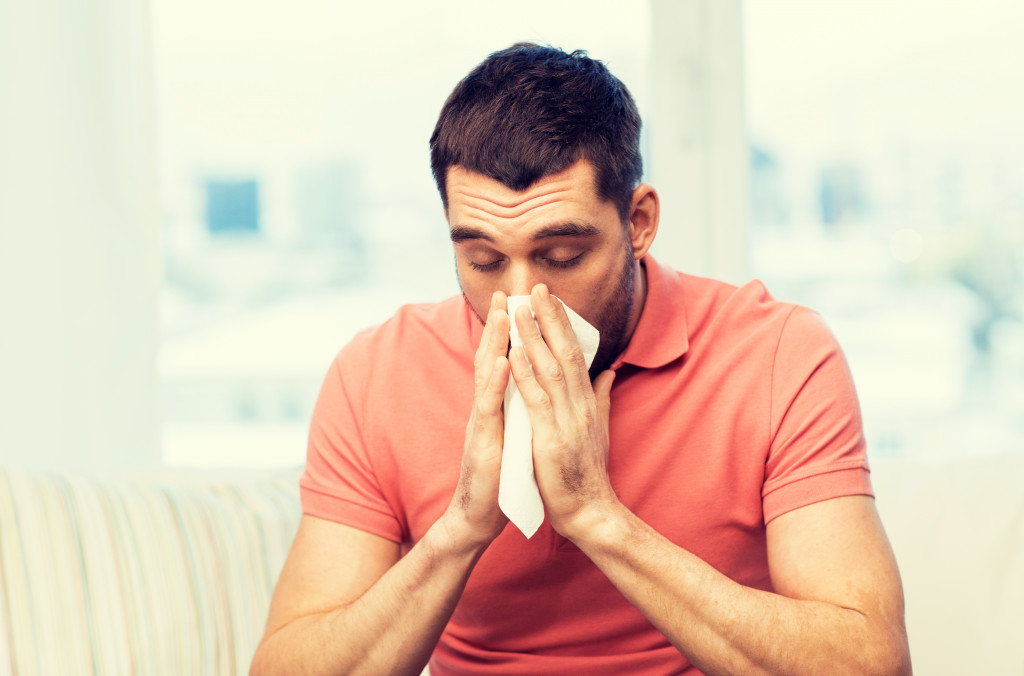- Poor indoor air quality can cause respiratory problems and irritation.
- Fire hazards in the home should be prevented through proper wiring and use of electrical appliances.
- Poisonous substances such as cleaning products, pesticides, and carbon monoxide should be stored out of reach of children and pets.
- Water damage can lead to mold growth which can cause respiratory problems and allergies.
- Preventing water damage includes hiring shingle roof replacement services, fixing leaky pipes, and ensuring adequate ventilation.
Your home should be a haven where you feel comfortable and secure. Unfortunately, there are several common health hazards lurking in many homes that can cause harm to you and your family. It’s essential to be aware of these hazards and take the necessary precautions to prevent them from causing health problems. In this blog post, we’ll examine some of the most common health hazards found in homes and provide tips on how to stay safe.
Poor Indoor Air Quality
Indoor air quality can be a significant health hazard, especially if you have poor ventilation. Over time, allergens, dust, and other pollutants can accumulate in your home’s air and cause irritation and respiratory problems.
Consider investing in an air purifier or ensuring your home’s duct work is clean and debris-free. You can also improve indoor air quality by keeping your carpets and upholstery clean and free from mold and mildew.
Fire Hazards

Fires can be devastating, causing severe damage to your home and putting you and your family at risk of injury or death. To prevent fires from starting, be sure to keep your home’s electrical wiring up to code and avoid using electrical appliances that are frayed or damaged. Also, refrain from leaving cooking food unattended and keep flammable materials a safe distance from heat sources.
Poisonous Substances
Many substances found in your home can be dangerous if ingested or inhaled, such as cleaning products, pesticides, and carbon monoxide. Be sure to store these toxic substances out of the reach of children and pets, and always follow the manufacturer’s instructions when using them.
Water Damage
Water damage does not only cause costly repairs, but it can also pose serious health risks to you and your family. It can lead to mold growth, contamination of water sources, and the release of harmful toxins into the air.
While some water damage may be minor, neglecting them can lead to severe health hazards. Therefore, knowing the common causes of water damage and how to prevent them is essential. Here are a few:
Damaged Shingle Roofs

A damaged shingle roof can cause water damage, particularly during heavy rainfalls or snowstorms. Missing, cracked, or loose shingles can lead to leaks in the top, eventually soaking through your ceilings and walls. The moisture from the leaks can create damp, humid conditions perfect for mold growth.
If so, you should consider hiring shingle roof replacement services. A professional roofer can inspect your home’s roof, replace any damaged shingles that may be causing water damage, and ensure that your home is safe and secure from water leaks.
Leaky Water Pipes
Leaky water pipes are a common cause of water damage in many homes. A burst pipe can cause immediate water damage, while a slow leak can go unnoticed for a long time, leading to long-term problems. When pipes leak, it can lead to damp, humid conditions that are perfect for mold growth to thrive.
Mold growth can cause respiratory problems, allergies, and other health issues. The moist conditions can also attract pests such as rodents and cockroaches, which can trigger respiratory problems and allergies. Therefore, getting leaky pipes fixed as soon as possible is essential.
Poor Ventilation
Poor ventilation can increase the risk of water damage in humid areas such as bathrooms and kitchens. The buildup of moisture can lead to the growth of mold on walls, ceilings, and other surfaces. The spores released by mold can cause respiratory problems, allergies, and other health complications.
To prevent water damage and mold growth, ensure adequate ventilation in areas where moisture is common. Consider installing exhaust fans in your bathroom and kitchen if you don’t have any.
Clogged Gutters and Downspouts
Gutters and downspouts are designed to keep rainwater away from your home’s foundation. However, they become ineffective when clogged with debris, such as leaves, twigs, and dirt. This can lead to water backup, and the water can seep into your home’s foundation, causing water damage.
Water damage resulting from clogged gutters and downspouts can lead to mold growth, which can cause respiratory problems, allergies, and other health hazards.
The Bottom Line
While it’s impossible to eliminate all health hazards from your home, awareness, and prevention can go a long way toward keeping your family healthy and safe. By taking steps to improve indoor air quality, prevent fires, store toxic substances safely, remove tripping hazards, and prevent water damage, you can significantly reduce the risk of health problems. Remember, staying informed and taking the necessary precautions is the key to a safe and healthy home.

